Romper
Stomper
1992
Director: Geoffrey Wright
Starring: Russell Crowe, Daniel
Pollock, Jacqueline McKenzie
Romper
Stomper is
many things, but one thing it is not is apologetic. “Unflinching.” “Gritty”
“Intense.” Yes, yes, and
yes. It’s also rather unpleasant. That’s not a bad thing per se, but the scant
90 minutes that you spend with this movie will not be the happiest of your
life. It’s perhaps most famous as the
film that put Russell Crowe on the map, and although I’m not the biggest
Russell Crowe fan in the world, it’s easy to see why he became a star after his
turn here. What I ultimately take from Romper
Stomper, though, is a bromance flick found in a rather unexpected
place.
Hando
(Crowe) is the de facto leader of a group of neo-Nazi skinheads living in
Melbourne. Davey (Pollock) is his best
mate and right hand man. Enraged at what
they perceive to be an encroaching Vietnamese population, the gang enacts
brutal retribution on local Asian innocents.
Epileptic and drug-addicted waif Gabe (McKenzie) catches Hando’s eye,
and she begins accompanying the gang on their beatings. One day, the Asians start to fight back
against the gang in a brutally lethal manner, and this triggers the slow
disintegration of the group that plays out for the rest of the film. Eventually, we are left only with Hando,
Davey, and Gabe, and the inevitable violent love triangle.
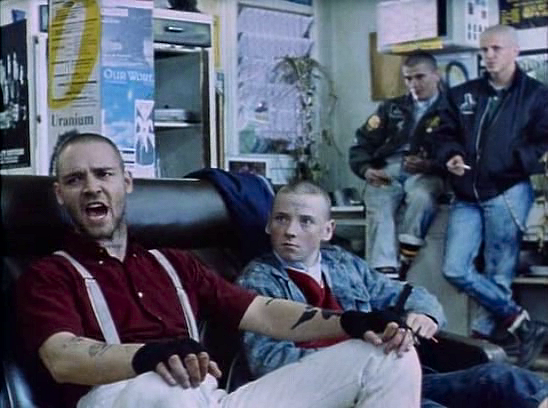 |
| Hando's insane. Seriously. Insane. |
There
is a lot of hate in this movie. Hi, it’s
about neo-Nazis. You can’t expect
heaping loads of tolerance and love.
Even knowing this in advance, it’s still very hard for me to stomach
this type of cruel bigotry. Hando’s gang
is as brutal as a bunch of thugs can get without guns. Watching them beat the crap out of random
people for no sane reason at all is a challenge. But much in the same way that A
Clockwork Orange starts with several ruthlessly cold fights then shifts
its focus, Romper Stomper does as well.
(In fact, there are many parallels between these two films.) After a long and chaotic fight where the
Asian community fights back and fights back hard, the skinheads are no longer
all-powerful. They are beaten, bloody,
and they have been forced into a humiliating retreat. For me, it helped me to watch the rest of the
film knowing that this group was not invincible. Knowing that such hateful speech and cruel,
unnecessary actions would ultimately have to be paid for made the bitter pill a
little easier to swallow. There is still
controversy to this day as to whether this film glorified the skinheads or was
a testimonial against them. I see
nothing about any kind of glory in this movie; it is particularly
unglamorous.
After
the turning point fight, the movie changes its momentum. The gang is on the run and they are breaking
down. The story shifts from being about
skinheads to being about Hando, Davey, and Gabe. This is a much more typical and common movie
story – two guys and one girl – but I was intrigued and invested in it. What really helps to set apart this
particular love triangle, because criminy we’ve seen a billion love triangles
before, is that it plays up all three angles of the triangle instead of just
two. This is not merely a story about
Gabe and Hando versus Gabe and Davey.
Hando and Davey’s relationship is just as important, if not more so,
than either of their interactions with Gabe.
Skinheads are hardly gentle people, but watching Hando put a makeshift
pillow under Davey’s head when Davey is passed out drunk is surprising in its
kindness. Hando kisses Davey several times,
and Davey seems to be the only one in the group who can exert any sort of
control over Hando. Hando may be having
sex with Gabe, but he loves Davey. Even
Gabe herself notes to Davey, “Hando doesn’t act like he likes me. He likes you, though, doesn’t he.” Indeed, when I first smelled the triangle in
the air of the film, I wasn’t entirely certain if it was because Davey wanted
Gabe for himself, or whether Davey wanted Hando for himself.
How
strongly is the male love angle played up in Romper Stomper? Well, I’ll put it this way. In an extended home invasion sequence
(another massively huge tip of the hat to A Clockwork Orange there), the piece
of classical music heard in the background is Bizet’s “Au fond du temple saint”
from the opera The Pearl Fishers. “Au fond du temple saint” is one of the more
famous pieces from all of opera. It’s a
duet between a tenor and a baritone, and in it, the two men sing about how they
both fell in love with the same priestess, but that they decided to give up their
love of her because of their friendship with one another. This song was not chosen randomly. Any piece of classical music may have
sufficed, but no, Wright picks one that specifically mirrors the plight of
Hando, Davey, and Gabe. This is total
and full-on bromance, albeit of the psychotic variety.
Additionally,
the performances of all three players in the triangle are very strong. Russell Crowe as Hando embraces his inner
psychotic, playing him with a frighteningly quiet power. The characters I fear the most are those who
do not shout and make lots of unnecessary noise, and this is Hando. Crowe is great in Hando’s physicality. Again, it’s easy to see why this movie was
the first step in propelling him to stardom.
As for Davey, Pollock is all shyness and unassuming gentle nature. He’s even likeable! Well, as much as a skinhead could be. Pollock manages to play the harder role of the
quiet sidekick who secretly, and maybe even unknowingly, wields power over the
leader. As the girl who comes between
them, McKenzie is the Australian drug-addled gang version of a manic pixie
dream girl. I like that McKenzie gives
Gabe her own strength, making her no one’s victim and not in need of any man to
take care of her. I like the touch of
Gabe’s wardrobe changing as she became more entrenched in Hando’s gang; she
goes from girlie frocks to a military style sweater and boots, but then back to
her original frock when she strikes out again on her own.
Perhaps
the reason this triangle works so well on screen is because, unnerving as it
may sound, there were apparently real life parallels. While filming, McKenzie and Pollock were
romantically involved. For his part,
Crowe had made a film prior to this with Pollock (Proof) so the two had
clearly worked together before and formed a bond. Sadly – very sadly – Pollock, himself a heroin
addict, committed suicide weeks after Romper Stomper wrapped filming by
throwing himself under a train. Russell
Crowe’s band wrote a song about it, called “The Night That Davey Hit the
Train.” This kind of awful true story
gives the tale that’s played out in Romper Stomper an extra dose of
tragic pathos.
The
sound choices are very good. The score
is full of very hollow effects, lots of echoes, and a great deal of sounds that
remind me of metal on metal. It gives
the film a vicious, biting feeling, but also one that underlines the emotional
emptiness of the skinhead lifestyle. The
only thing most of the gang members feel is blind hate. What sort of existence is that, to be
compelled by such an empty feeling?
It
took two days and two viewings of Romper Stomper for me to finally
decide where I stand on it. Watching the
first half is difficult, because that is when the neo-Nazi skinhead mentality
is presented most fully, and neo-Nazi skinhead philosophy is not pleasant. However, I think the triangle of Hando,
Davey, and Gabe that takes center stage in the second half is one of the most
intriguing, intense, and oddly enough, emotionally compelling relationships
I’ve seen in some time. The final beach
scene is one that sticks to my ribs, infects my brain, and refuses to let me
forget it.
Hando
and Davey: psychotic skinhead bromance, for real, yo. Hando + Davey 4-eva.
Arbitrary
Rating: 8/10. As distasteful as it first
seemed to me, I really like this one.
It’s not pleasant, oh no, but it’s intense and compelling.
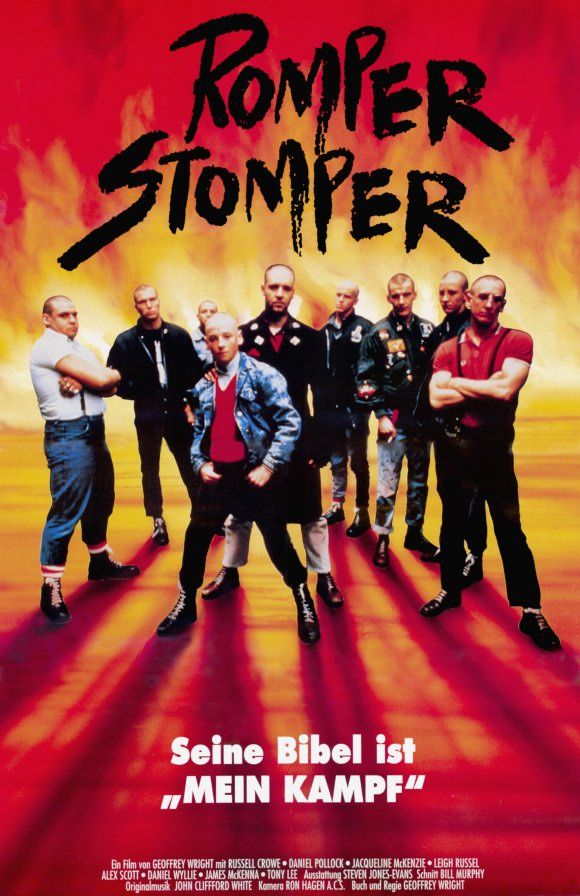
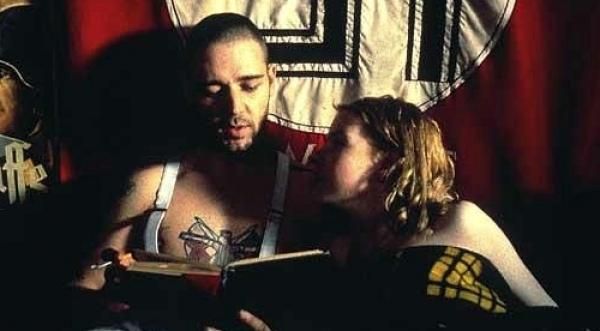
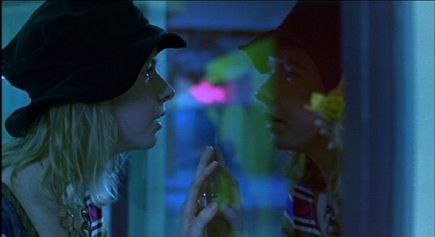
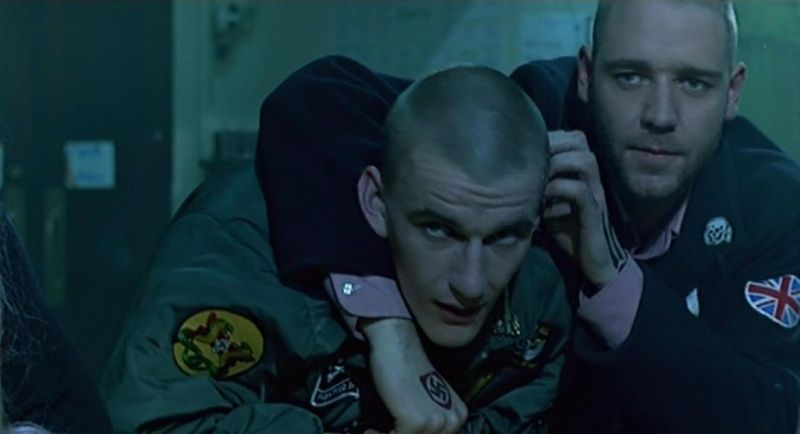
I completely agree on the Clockwork Orange references, right down to Crowe taking a long, refreshing drink of milk right out of the bottle when he gets up.
ReplyDeleteI actually enjoyed the violence...when it was the skinheads getting their asses handed to them by the Asians. The triangle bit was a little less interesting to me simply because, like you said, it's a pretty standard movie construct.
I didn't know of the suicide when I was watching the film, but I learned about it shortly afterwards.
I definitely "enjoyed" the violence more when the skinheads got beat up. They had it coming, man.
DeleteWhile *I* got sucked into the love triangle, I can also logically see the argument of "typical love triangle" here.
Ditto for me and the suicide - I tell you, though, it made me see the story in a bit of a bleaker light. (as if the ending wasn't dark enough...)
Yeah, I think you mentioned in your comment on Steve's blog about Clockwork Orange that we also have the beating up of the old man in the tunnel at the beginning, and Hando in the white suspenders and pants. And then the home invasion.
Fantastic point about all three sides of the love triangle. For me, the Hando/Davey bromance is first and foremost. I think that's an interesting aspect of the film--while there aren't specifically homosexual overtones there, there sort of are, as there are with any male-dominated social group, especially those that would be the most dead-set against them.
ReplyDeleteYou're right--it is a difficult film, but it's one worth getting through.
At first glance, on a superficial level, it's more Gabe/fill in the blank, but as the movie progresses, the more I thought about it, Hando/Davey is the core. I like your note about homosexual overtones - absolutely true. And, as you point out, rather ironic considering they are skinheads.
Deletegolden goose
ReplyDeletekyrie irving shoes
yeezy shoes
fear of god hoodie
golden goose
kd shoes
fear of god essentials hoodie
supreme clothing
off white
nike sb dunks
duuiixaang985k
ReplyDeletegolden goose outlet
golden goose outlet
golden goose outlet
golden goose outlet
golden goose outlet
golden goose outlet
golden goose outlet
golden goose outlet
golden goose outlet
golden goose outlet